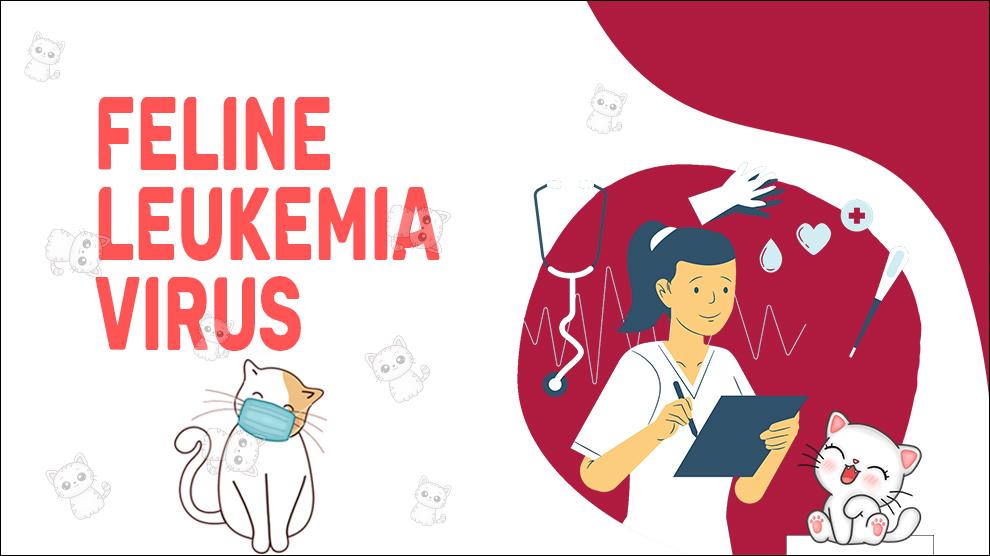What Is Feline Leukemia Virus?
Feline leukemia virus (FeLV) is a common viral disease in cats caused by a retrovirus. FeLV affects the immune system and can lead to anemia, cancer, and other serious health problems.
Although there is no cure for FeLV, early detection and management can help to improve a cat's quality of life and prolong its lifespan.
Clinical Signs Of Feline Leukemia Virus
Symptoms of FeLV can be varied and may not always be apparent. Some cats may not show any symptoms at all, while others may display a range of clinical signs.
Some of the common symptoms of FeLV include:
- Lethargy and decreased energy levels
- Loss of appetite and weight loss
- Fever and recurrent infections
- Anemia, leading to pale gums and weakness
- Swollen lymph nodes
- Respiratory problems
- Gingivitis and other dental problems
- Tumors and other forms of cancer
- Dull Coat
- Enlarged Lymph Nodes
- Discoloration Of Gums
- Gum Inflammation
- Diarrhea
- Seizures
- Changes In Behavior
- Discoloration Of Eyes
- Lethargy
- Difficulty Breathing
- Mouth Inflammation
Treatment Options For Feline Leukemia Virus
There is no specific cure for the feline leukemia virus. However, supportive treatments can help in managing the symptoms and complications associated with the virus.
These treatments include:
- Antiviral medications: Some antiviral medications can help in slowing down the progression of the virus.
- Chemotherapy: Chemotherapy may be recommended for cats with lymphoma or leukemia.
- Blood transfusions: If your cat is anemic, a blood transfusion may be necessary to replace the lost blood cells.
- Antibiotics: Antibiotics can be prescribed to treat secondary bacterial infections.
- Nutritional support: Proper nutrition is essential for cats with the feline leukemia virus. Your veterinarian may recommend a special diet or supplements to help support your cat's immune system and overall health.
Home Remedies For Feline Leukemia Virus
There are no home remedies for feline leukemia virus, but providing your cat with a balanced diet, plenty of fresh water, and a stress-free environment can help support its immune system and overall health.
How To Prevent Feline Leukemia Virus?
Preventing feline leukemia virus involves limiting your cat's exposure to the virus.
Here are some preventive measures that can help reduce the risk of infection:
- Vaccination: Vaccination is the most effective way to prevent the feline leukemia virus. The vaccine is usually given to kittens at around eight to nine weeks of age and requires a booster shot several weeks later.
- Keeping your cat indoors: Keeping your cat indoors can help prevent exposure to other infected cats.
- Testing: If you have a new cat, it is important to have them tested for feline leukemia virus before introducing them to other cats.
- Spaying or neutering: Cats that are not spayed or neutered are more likely to roam and come into contact with other cats.
- Regular veterinary check-ups: Regular veterinary check-ups can help identify and treat any health issues early on, including the feline leukemia virus.
Affected Cat Breeds Of Feline Leukemia Virus
Feline leukemia virus can affect cats of any breed, but certain breeds may be more susceptible to the virus, such as Siamese and Himalayan cats.
Causes For Feline Leukemia Virus
Causes:
FeLV is caused by a retrovirus, which is transmitted from an infected cat to an uninfected one through close contact.
The virus is present in the saliva, urine, and other bodily fluids of infected cats. Kittens are particularly susceptible to FeLV, as their immune systems are still developing.
In adult cats, the risk of infection is higher if they live in multi-cat households, go outside frequently, or have weakened immune systems.
When To See A Vet For Feline Leukemia Virus?
If you suspect that your cat may have feline leukemia virus, it is important to take them to a veterinarian as soon as possible.
Early detection and treatment can help manage the symptoms and improve your cat's quality of life.
Signs to watch out for include:
- Lethargy and loss of appetite
- Pale gums
- Weight loss
- Frequent infections
- Swollen lymph nodes
- Fever
- Vomiting and diarrhea
Food Suggestions For Feline Leukemia Virus
Proper nutrition is essential for cats with the feline leukemia virus.
Your veterinarian may recommend a special diet or supplements to help support your cat's immune system and overall health.
It is important to provide your cat with high-quality food that is rich in protein and essential nutrients.
Conclusion
Feline leukemia virus is a serious disease that can lead to a wide range of health issues.
While there is no specific cure, supportive treatments can help manage the symptoms and complications associated with the virus.
Preventive measures, such as vaccination, keeping your cat indoors, and regular veterinary check-ups, can help reduce the risk of infection.
If you suspect that your cat may have the feline leukemia virus, it is important to seek veterinary care as soon as possible.











